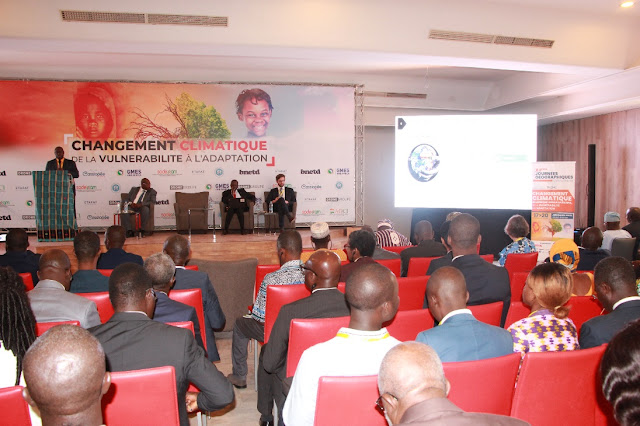Gmes Experts Call For Investment In Space Science To Tackle Climate Change
Gmes Experts Call For Investment In Space Science To Tackle
Climate Change
Group of Experts and
participants at the GMES – ECOWAS workshop
Experts
at a three-day regional conference of geographers and other scientists in Ivory
Coast have called for more investments in space science in Africa to help
tackle the climate change menace.
It is
estimated that more than 40 billion dollars will annually be lost or absorbed
in Africa due to the consequences of climate change effects. Therefore, to
reduce the consequences of climate change in Africa, which has become the most
vulnerable despite being the less contributor to climate change, the science
experts are advocating a reduced impact of climate change through adaptation
measures.
The
12th edition of the 3-day ECOWAS and Global Monitoring for Environment and
Security (GMES) & Africa conference brought together over 150 science
experts, students, policy makers and traditional leaders to deliberate on
issues affecting the climate. The three consortia that came together are the
marine consortium of University of Ghana (Ghana), the lands consortium of
“Centre de Suivi Ecologique” (Senegal) and the African Regional Centre for Space Science & Technology Education (Nigeria). The
workshop was held in Grand Bassam, Cote d’Ivoire, from 17 to 19 February 2020.
Speaking
at the event, the Space Science Expert and Coordinator for the GMES &
Africa programme, Dr. Tidianne Ouattara, called for close collaboration with
the private sector, while advocating the integration of indigenous knowledge on
the ecosystem into the work of scientists. In explaining briefly the status of
the GMES and Africa project, Dr. Ouattara indicates that the second phase of
the program will be devoted to climate change. He charged all countries to have
a window for accessing data and underscored the need for a shift from the
traditional way and usage of Earth observation data and adopt a new way of
using the data.
Dr. Tidianne Ouattara, Space
Science Expert and Coordinator for the GMES & Africa programme
“People
are no longer interested in reading the maps and statistics” Dr Ouattara added.
He also called for the harnessing of existing capacities and promotion of new
ones and the training of students to be able to work with the private sector.
The representative
of the United Nations Economic Commission for Africa (UNECA), Dr. Andre
Nouguiera, explained the need for investment in Space science in the region
while calling for improved governance in the development of
information. “We need to address urgent needs of development at National
and regional levels by heading towards the production of services and not only
producing maps and statistics”.
According
to Prof George Wiafe, the Project Manager of the University of Ghana’s
consortium, “We must be innovative in encouraging the startup businesses and
companies to invest in earth observation, to be able to leave a legacy for the future
generation.”
GMES
and Africa is an Earth Observation programme of the African Union , jointly
established with the European Union, and designed to strengthen capacities in
Africa for the optimal exploitation and utilisation of Earth Observation
systems, data and technologies towards the continent’s sustainable development.
Source: Regional Marine Centre, University
of Ghana





Comments
Post a Comment